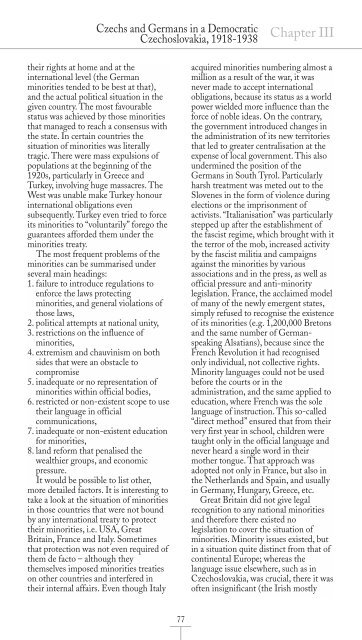the nationality of all inhabitants of the czech provinces and ...
the nationality of all inhabitants of the czech provinces and ...
the nationality of all inhabitants of the czech provinces and ...
Create successful ePaper yourself
Turn your PDF publications into a flip-book with our unique Google optimized e-Paper software.
Czechs <strong>and</strong> Germans in a Democratic<br />
Czechoslovakia, 1918-1938<br />
<strong>the</strong>ir rights at home <strong>and</strong> at <strong>the</strong><br />
international level (<strong>the</strong> German<br />
minorities tended to be best at that),<br />
<strong>and</strong> <strong>the</strong> actual political situation in <strong>the</strong><br />
given country. The most favourable<br />
status was achieved by those minorities<br />
that managed to reach a consensus with<br />
<strong>the</strong> state. In certain countries <strong>the</strong><br />
situation <strong>of</strong> minorities was liter<strong>all</strong>y<br />
tragic. There were mass expulsions <strong>of</strong><br />
populations at <strong>the</strong> beginning <strong>of</strong> <strong>the</strong><br />
1920s, particularly in Greece <strong>and</strong><br />
Turkey, involving huge massacres. The<br />
West was unable make Turkey honour<br />
international obligations even<br />
subsequently. Turkey even tried to force<br />
its minorities to “voluntarily” forego <strong>the</strong><br />
guarantees afforded <strong>the</strong>m under <strong>the</strong><br />
minorities treaty.<br />
The most frequent problems <strong>of</strong> <strong>the</strong><br />
minorities can be summarised under<br />
several main headings:<br />
1. failure to introduce regulations to<br />
enforce <strong>the</strong> laws protecting<br />
minorities, <strong>and</strong> general violations <strong>of</strong><br />
those laws,<br />
2. political attempts at national unity,<br />
3. restrictions on <strong>the</strong> influence <strong>of</strong><br />
minorities,<br />
4. extremism <strong>and</strong> chauvinism on both<br />
sides that were an obstacle to<br />
compromise<br />
5. inadequate or no representation <strong>of</strong><br />
minorities within <strong>of</strong>ficial bodies,<br />
6. restricted or non-existent scope to use<br />
<strong>the</strong>ir language in <strong>of</strong>ficial<br />
communications,<br />
7. inadequate or non-existent education<br />
for minorities,<br />
8. l<strong>and</strong> reform that penalised <strong>the</strong><br />
wealthier groups, <strong>and</strong> economic<br />
pressure.<br />
It would be possible to list o<strong>the</strong>r,<br />
more detailed factors. It is interesting to<br />
take a look at <strong>the</strong> situation <strong>of</strong> minorities<br />
in those countries that were not bound<br />
by any international treaty to protect<br />
<strong>the</strong>ir minorities, i.e. USA, Great<br />
Britain, France <strong>and</strong> Italy. Sometimes<br />
that protection was not even required <strong>of</strong><br />
<strong>the</strong>m de facto – although <strong>the</strong>y<br />
<strong>the</strong>mselves imposed minorities treaties<br />
on o<strong>the</strong>r countries <strong>and</strong> interfered in<br />
<strong>the</strong>ir internal affairs. Even though Italy<br />
77<br />
Chapter III<br />
acquired minorities numbering almost a<br />
million as a result <strong>of</strong> <strong>the</strong> war, it was<br />
never made to accept international<br />
obligations, because its status as a world<br />
power wielded more influence than <strong>the</strong><br />
force <strong>of</strong> noble ideas. On <strong>the</strong> contrary,<br />
<strong>the</strong> government introduced changes in<br />
<strong>the</strong> administration <strong>of</strong> its new territories<br />
that led to greater centralisation at <strong>the</strong><br />
expense <strong>of</strong> local government. This also<br />
undermined <strong>the</strong> position <strong>of</strong> <strong>the</strong><br />
Germans in South Tyrol. Particularly<br />
harsh treatment was meted out to <strong>the</strong><br />
Slovenes in <strong>the</strong> form <strong>of</strong> violence during<br />
elections or <strong>the</strong> imprisonment <strong>of</strong><br />
activists. “Italianisation” was particularly<br />
stepped up after <strong>the</strong> establishment <strong>of</strong><br />
<strong>the</strong> fascist regime, which brought with it<br />
<strong>the</strong> terror <strong>of</strong> <strong>the</strong> mob, increased activity<br />
by <strong>the</strong> fascist militia <strong>and</strong> campaigns<br />
against <strong>the</strong> minorities by various<br />
associations <strong>and</strong> in <strong>the</strong> press, as well as<br />
<strong>of</strong>ficial pressure <strong>and</strong> anti-minority<br />
legislation. France, <strong>the</strong> acclaimed model<br />
<strong>of</strong> many <strong>of</strong> <strong>the</strong> newly emergent states,<br />
simply refused to recognise <strong>the</strong> existence<br />
<strong>of</strong> its minorities (e.g. 1,200,000 Bretons<br />
<strong>and</strong> <strong>the</strong> same number <strong>of</strong> Germanspeaking<br />
Alsatians), because since <strong>the</strong><br />
French Revolution it had recognised<br />
only individual, not collective rights.<br />
Minority languages could not be used<br />
before <strong>the</strong> courts or in <strong>the</strong><br />
administration, <strong>and</strong> <strong>the</strong> same applied to<br />
education, where French was <strong>the</strong> sole<br />
language <strong>of</strong> instruction. This so-c<strong>all</strong>ed<br />
“direct method” ensured that from <strong>the</strong>ir<br />
very first year in school, children were<br />
taught only in <strong>the</strong> <strong>of</strong>ficial language <strong>and</strong><br />
never heard a single word in <strong>the</strong>ir<br />
mo<strong>the</strong>r tongue. That approach was<br />
adopted not only in France, but also in<br />
<strong>the</strong> Ne<strong>the</strong>rl<strong>and</strong>s <strong>and</strong> Spain, <strong>and</strong> usu<strong>all</strong>y<br />
in Germany, Hungary, Greece, etc.<br />
Great Britain did not give legal<br />
recognition to any national minorities<br />
<strong>and</strong> <strong>the</strong>refore <strong>the</strong>re existed no<br />
legislation to cover <strong>the</strong> situation <strong>of</strong><br />
minorities. Minority issues existed, but<br />
in a situation quite distinct from that <strong>of</strong><br />
continental Europe; whereas <strong>the</strong><br />
language issue elsewhere, such as in<br />
Czechoslovakia, was crucial, <strong>the</strong>re it was<br />
<strong>of</strong>ten insignificant (<strong>the</strong> Irish mostly


